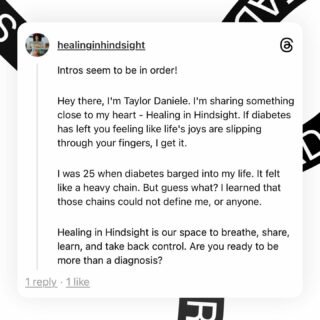That inner critic loves to work overtime! We all have one. The voice that always ruins the party when we pass the dessert table. It pipes up when you wanna eat a burger. When you’re late tacking your meds or you need to correct your insulin dosage, it’s right there to remind you of what you shave done.
But here’s the thing. You can give them the pink slip and send them packing. Even better? Get to know them and remind them who runs the show.
KEY POINTS
- What your inner critic is
- What it represents
- How to turn your inner critic into an ally
Find more at www.healinginhindsight.com
Resources
Discipline episode with Lindsey Simcik
Connect
- Instagram @healinginhindsight
- Facebook.com/healinginhindsight
- YouTube: Healing in Hindsight™
Healing in Hindsight™ is managed by host Taylor Daniele™ and Produced by We Are 8 Studios
Transcript
Hey, everybody.
Taylor:Welcome back to another episode of healing in hindsight, your no BS
Taylor:source for thriving with diabetes.
Taylor:You know, Me, Taylor, Daniele, and here for another hindsight,
Taylor:talks, hindsight thoughts.
Taylor:Both.
Taylor:And I'm pretty excited about this one, because I feel like this
Taylor:is relevant to anybody, not just diabetics, but non-diabetics alike and
Taylor:that is defeating our inner critic.
Taylor:And everybody has this, that little voice in your head that every time
Taylor:that you're getting ready to do something, try something, or even
Taylor:just waking up some times their mouth is running and kind of, yeah.
Taylor:Controlling your day, sometimes making you feel like you're undeserving, unworthy,
Taylor:and not able to achieve the things that you want, but here to say not true.
Taylor:And we're going to talk about ways that you can work with your inner critic,
Taylor:for your advantage, for your benefits.
Taylor:That way you can push forward into the goals and things that you want,
Taylor:whether it's pertaining to your body, whether it's pertaining to your
Taylor:diagnosis, whether it's pertaining to anything that you want to achieve.
Taylor:So.
Taylor:Before we get into that though, I do want to mention shameless plug.
Taylor:It is, my show.
Taylor:But I recently just launched my very first program called expedition.
Taylor:You journey to your best self.
Taylor:And this program is very near and dear to my heart because it is basically taking
Taylor:a lot of the things that I've learned and struggled with on how to achieve the
Taylor:body and the health that I want without losing time or motivation along the way.
Taylor:Y'all know, it's a busy life being a podcaster when you're trying to work.
Taylor:When you're trying to record, when you're trying to solidify guests, when
Taylor:you're trying to make sure that you're bringing in some money every day,
Taylor:whether that's through a full-time job or if you're like me and you decided to.
Taylor:Go in on your own, right?
Taylor:It is always a struggle and trying to fit in all of these different
Taylor:habits and things to ensure that your body is optimized to its
Taylor:absolute best can be a challenge.
Taylor:So if this sounds like you, please reach out to me on Instagram@healinginhindsight
Taylor:or @justtaylordaniele with one L and let me know what your thoughts are.
Taylor:Let me know how I can assist you.
Taylor:And.
Taylor:Might even have something special going on with my program, since it is brand new.
Taylor:And I'm bringing in founding members, so expedition you journey to your best self.
Taylor:Definitely hit me up if you want it on that, with that said let's do it.
Taylor:So your inner critic, it is, it is really interesting when I first came into the
Taylor:idea of, working with the things that.
Taylor:You feel like you struggle with and seeing it as an ally?
Taylor:My girl Lindsay, Simsek over at almost 30, did an episode on discipline and how
Taylor:discipline should be seen as an ally.
Taylor:And that really, I don't know, it really triggered something in me in
Taylor:a good way that opened me up to the idea of all of the things that we
Taylor:see as flaws or things that are bad.
Taylor:May just kind of be this dark and scary thing that.
Taylor:Actually isn't and it makes me think of that scene in marijuana.
Taylor:Spoiler alert, if you have not watched the movie where the Island
Taylor:goddess is this big volcanic monster.
Taylor:And once she received what was returned to her, then she goes back into this
Taylor:peaceful, calm, beautiful Island covered in greenery, all of these things.
Taylor:And so that's how I feel like our inner critics are now.
Taylor:Your inner critic can be anything.
Taylor:It can be anyone.
Taylor:We tend to put a visualization over this voice or thing in our head
Taylor:that is telling us that we're wrong.
Taylor:We're bad.
Taylor:We can't do anything right.
Taylor:You get it.
Taylor:So something that I like to do is just to, to name it, what is your inner critic?
Taylor:And for me, it is, it is myself.
Taylor:I am my worst critic.
Taylor:I know that, that seems to be a common cliche thing.
Taylor:But truly when I think about all of the things that I don't feel confident in,
Taylor:or when I feel like I'm hearing that voice, that's like, Hey, you probably
Taylor:shouldn't be doing this anyways.
Taylor:Whatever it is, truly myself.
Taylor:There used to be a point where I would hear my parents.
Taylor:There used to be a point where I would hear my friends but it really wasn't them.
Taylor:When I, when I really boiled down to it, I was making up the thoughts and the,
Taylor:sayings and putting their faces to it because it gave me somebody to blame.
Taylor:Now, I'm not saying that's the case for everybody.
Taylor:Sometimes your worst inner critic really is someone related to you or a friend.
Taylor:So I'm not saying that that can be a possibility, but at the core
Taylor:for me, I recognize that it was all of the things that I felt
Taylor:shame and guilt about for myself.
Taylor:And I would just put, different names and faces to it in order to somewhat make me
Taylor:feel better because then it felt good to like, no mom, no dad, no friend, whatever.
Taylor:You're wrong, but it's really myself.
Taylor:And it definitely changed how I talked to myself.
Taylor:Now, when it comes to dealing with your inner critic, once,
Taylor:once you kind of face that.
Taylor:I or whatever visual you have.
Taylor:Some people literally have some type of appearance.
Taylor:It's like this crazy weird looking monster thing.
Taylor:We have this visual of like, when something bad is going on in our
Taylor:minds, and we hear all of these negative thoughts it's coming from
Taylor:this, dark, visually unappealing thing that we've created in our minds.
Taylor:And a lot of times we don't want to face it.
Taylor:We see it in TV and movies all the time where.
Taylor:Someone is having some form of mental break, either in their dreams or whatever.
Taylor:And in order to face their fears, they have to go face.
Taylor:The thing that they're scared of.
Taylor:And usually it's in the form of something for me, it's spiders.
Taylor:But you know, something that you don't like a snake or whatever.
Taylor:And usually when they get to it and they defeat it, they slay the monster
Taylor:or whatever what's left is either.
Taylor:Acute and misunderstood version of it, right.
Taylor:Or sometimes themselves.
Taylor:And I like to think of the, the Kermit the frog meme, where you got Kermit at the
Taylor:mirror and then the one with the hood on.
Taylor:And they're like, yeah, just do it anyways.
Taylor:Like it's, it's that?
Taylor:And so the thing about facing your inner critic is it puts you in a place
Taylor:where not only are you able to recognize that it is not as scary as you think.
Taylor:But you're able to actually learn and understand why I feel like Animade
Taylor:does a really good job of these visualizations of like whenever something
Taylor:I think of bleaching when it comes to mind, whenever some, whenever spirit.
Taylor:Yeah.
Taylor:Turns into this monster thing.
Taylor:There's a core reason as to why it changed into this.
Taylor:And it's because it's this buildup of sorrow, of anger, of, longing
Taylor:of feeling like they didn't finish something and lift whatever, there's
Taylor:always this underlying theme that.
Taylor:Something evil that comes from something is a deep root of an unfulfilled desire of
Taylor:some sort or something, some emotion that didn't get expressed or, some vendetta of
Taylor:something that didn't get to be completed.
Taylor:And so I like to think of our inner critic as the same thing that when
Taylor:you start hearing those negative thoughts, that it's more so.
Taylor:Something deeper.
Taylor:That's going on, that's making you do this.
Taylor:And what I've kind of come to a realization for my inner critic
Taylor:is that it's kind of like my dogs innocence, that my inner critic
Taylor:is actually trying to protect me.
Taylor:It's not trying to harm me.
Taylor:It's not trying to make me feel like I'm less than, and that I don't deserve
Taylor:all of the things that I want in life.
Taylor:It is saying, Hey, Red flag.
Taylor:Don't go do not collect $200 caution tape.
Taylor:All the signs that say this is bad, don't do it.
Taylor:And sometimes whenever people that we care about, try to warn us about
Taylor:something, especially something that we feel very strongly about.
Taylor:We can have the tendency to be like, no, No, I think it'll be fine.
Taylor:And it's definitely a gamble of having to really dig into your intuition of like,
Taylor:should I continue forward or should I heed the advice of my support system?
Taylor:Right.
Taylor:And sometimes we.
Taylor:Continue to do it anyways.
Taylor:It's the same philosophy of dogs, and why they say, Hey, sometimes you need
Taylor:to do hand cues along with a verbal cue because they hear your voice all day long.
Taylor:So it's very easy for them to, not see or hear rather what
Taylor:you're trying to get them to do.
Taylor:But whenever you do a hands-on or you include a treat with something
Taylor:some type of actual thing, then they pay more closer attention.
Taylor:And so.
Taylor:It's kind of the same thing.
Taylor:Our inner critic is going off for all of these reasons and we have to
Taylor:have kind of a miniature discussion on, okay, why are you freaking out?
Taylor:Why are you warning me of this thing?
Taylor:And the reason why I bring up my dogs in particular is because
Taylor:it's kind of that thing, my dogs.
Taylor:And I don't know if anybody else has, does this.
Taylor:You can definitely let me know if they do, but they will bark and
Taylor:make noise for pretty much anything.
Taylor:If they hear a loud bang or a knock, then you know, they'll start barking
Taylor:or they'll start growling or making weird noises because they're just,
Taylor:all they know is they, I heard something strange and I don't know
Taylor:what it is cause I can't see it.
Taylor:I can't identify what it is.
Taylor:So I need to alert somebody.
Taylor:And for the most part, sure.
Taylor:It's helpful.
Taylor:Especially, I live by myself and so.
Taylor:When you're a female living loan, you don't have a guard system.
Taylor:I have an alarm thing on my house, but it's nice when my dogs, especially my
Taylor:oldest makes some noise of like, Hey, there's some movement outside the door.
Taylor:Don't know what it is, but going to alert you about it.
Taylor:Right.
Taylor:But it's the excessiveness of the warning.
Taylor:So she will bark and bark and bark and is kind of taught
Taylor:her a little brother the same.
Taylor:And when it's something like, Hey, It's my food delivery, right.
Taylor:Or it's my partner getting ready to come in the door or it's someone across the
Taylor:hall, I have a ring device and it's not even anybody coming towards the door,
Taylor:they just walked past it or they were, it's my neighbor, it's a false alarm.
Taylor:And it kind of creates this, little dog cried Wolf kind of set up.
Taylor:And so I have to train them that it's okay to alert me.
Taylor:But only if I say it's worth going off about, should you do it?
Taylor:And so now with some different training tactics, my dogs do not
Taylor:bark excessively at crazy noises.
Taylor:And sometimes it's yourself.
Taylor:Sometimes I've dropped something or I banged on something or I'm, thinking
Taylor:and I'm sitting at my desk editing and I'm like, start knocking or
Taylor:wrapping my fingers on, on the desk.
Taylor:And they think it's somebody at the door and it's not.
Taylor:And I have to literally yell at them.
Taylor:Like, it's me, it's me.
Taylor:Like.
Taylor:Stop freaking out.
Taylor:I'm the one who made the noise.
Taylor:And so I feel like our inner critic is the same thing.
Taylor:It's making all these alarms and saying all these things and we need
Taylor:to be the alpha in the situation, if you will and say, Hey, Hey,
Taylor:Hey, thanks for the heads up.
Taylor:Appreciate you.
Taylor:But a it's cool.
Taylor:Or B you know what?
Taylor:This is something I forgot about.
Taylor:Okay.
Taylor:We can proceed to, figure out ways to get around the situation.
Taylor:And so once you kind of recognize that it is simply your internal system,
Taylor:trying to warn you of something, then you're able to utilize that
Taylor:understanding to your advantage.
Taylor:So I will take, launching the show even launching my program
Taylor:that I mentioned earlier, that.
Taylor:There's all these things inside of me.
Taylor:That's like, Oh my God, freak out.
Taylor:This is insane.
Taylor:Like, this is going to be something major.
Taylor:This is, what if nobody signs up?
Taylor:What if nobody listens?
Taylor:What if nobody pays attention?
Taylor:What if nobody watches?
Taylor:What if nobody responds to your posts?
Taylor:No matter how many hashtags you put on them, because you follow all of these
Taylor:different strategies and all these things.
Taylor:What if the medication doesn't work, what if you can't lower your A1C?
Taylor:What if you are not able to, deal with changing your food and all this stuff
Taylor:like that, you just go into this spiral.
Taylor:Right?
Taylor:But in recognizing that it is simply your defense mechanism going on, you
Taylor:can say, Hey, Hey, Hey, Hey, Hey, slow down, slow down, slow down.
Taylor:What is it?
Taylor:What's what's really going on.
Taylor:Why are you reacting this way?
Taylor:And.
Taylor:Then you can actually have a dialogue with yourself and really understand, okay, my
Taylor:doctor put me on this new medication and I'm really nervous about it because it
Taylor:makes me feel like I'm not getting better.
Taylor:It makes me feel like I'm getting worse.
Taylor:It makes me feel like I'm not progressing.
Taylor:And that way you can really start to unpack those feelings.
Taylor:Hey, this is my first time launching a program.
Taylor:And even though I've trained so many people in the corporate setting to
Taylor:train people on something that is purely my own, it scares me because
Taylor:if people don't like it or it doesn't do what people want it to do.
Taylor:I'm afraid of the blow back when in reality, it's just it's okay.
Taylor:I've worked really hard to create something that I feel is powerful
Taylor:and the right people will come and the right people will go through it.
Taylor:And the right people will see the type of change that they
Taylor:want because I did it for myself.
Taylor:So we have to slow ourselves down and meet our emotions and our defense
Taylor:mechanism where it's at and ask.
Taylor:What's really going on.
Taylor:And how can we change this?
Taylor:How can we get to the root cause of this and say, it's going to be okay.
Taylor:Thank you for the warning.
Taylor:I got this.
Taylor:And I feel like the, the author's name is totally leaving my mind right now.
Taylor:So please forgive me.
Taylor:But the author of worry, wonder over worry, says it so beautifully.
Taylor:And I've been doing this exercise for a while and then, and of course are
Taylor:heard this on the almost 30 podcasts, but, in order to really drive it
Taylor:home, I feel like Lindsay's discipline episode really tied it all together.
Taylor:And.
Taylor:Well, the author in wonder over where he's basically, having you do, there's
Taylor:an exercise in the midst of the book, because she does a lot of journal prompts
Taylor:in that whenever you are feeling that anxiety, whenever your inner critic is
Taylor:starting to run its mouth and kind of go a little bit crazy write it all down, right.
Taylor:Or do some deep breathing and meditation, just ask, Hey, Hey,
Taylor:thank you for the heads up.
Taylor:What do you need from me?
Taylor:What is going on?
Taylor:That what is the deeper cause of this?
Taylor:And when I started doing those kinds of journal prompts of the things that
Taylor:I was scared of and things that I'm like, what if, what if, what if, what
Taylor:if, what if that's, when it really started to make sense that there's a
Taylor:part of me that just needed a bit of extra nurturing and extra reassurance?
Taylor:I feel like, Bernays, Brene Brown's work in shame and guilt and vulnerability
Taylor:is also something that's really great to think about, especially in the
Taylor:terms of the man in the arena speech And how, you kind of have to take
Taylor:off all this armor in order to move.
Taylor:I feel like 300 did a really good representation of that,
Taylor:where he's like kneeling and he's like putting his weapon down.
Taylor:And you think that he's giving up when in reality, the narrator tells
Taylor:you all the things that he had to do in order to get the perfect aim
Taylor:in order to take out his enemy.
Taylor:Right.
Taylor:And that's what your inner critic is doing.
Taylor:It is meeting to voice.
Taylor:What its concerns are and you needing to disarm it.
Taylor:So that way you can make precise decisions and take aim to knock out
Taylor:whatever the concern or fear is.
Taylor:So how do you work with this?
Taylor:How do you disarm it and now move forward with it?
Taylor:So once you've recognized what the concern is, and once you've disarmed all of
Taylor:the, what is the, I am scared, whatever.
Taylor:Then it's time to take action because if we sit too long, we'll
Taylor:start the cycle all over again.
Taylor:I definitely love the five second rule.
Taylor:I don't know if you guys are aware of it where like, instead of thinking through,
Taylor:if you should do something or not, you give yourself five seconds and you do it.
Taylor:And that is honestly helped me through so much.
Taylor:It is pushed me to put myself out there in ways that.
Taylor:I never thought I honestly would.
Taylor:From, Hey, any, does anybody want to share what these thoughts are?
Taylor:Right.
Taylor:And to, Hey let me just, I nervous about asking this person, if they
Taylor:would be willing to let me do this thing or be on their show or whatever.
Taylor:It is truly been helpful.
Taylor:Now I know sometimes people will do three seconds to I give myself
Taylor:five seconds, so that way I can have the extra two seconds to overthink.
Taylor:Because I think it's fair to allow yourself to kind of go
Taylor:down that path a little bit.
Taylor:You just have to limit that time.
Taylor:I always say, whenever something goes wrong or it doesn't go my way
Taylor:or it doesn't turn out how I would have hoped that I get 2.5 seconds
Taylor:to cry about it or flip out about it, freak out, be angry, whatever.
Taylor:And then after that, we got to get back to a regular scheduled program and
Taylor:come up with a plan to move forward.
Taylor:And so that's kind of what this is.
Taylor:So when you disarm, whatever it is, that's sounding the alarm.
Taylor:You have to take action and determine what that action is.
Taylor:So for example, I'm really freaked out about this medication
Taylor:that my doctor put me on.
Taylor:It makes me feel like I have, taking step backwards.
Taylor:It makes me feel like I'm not progressing.
Taylor:And that I'm a bad diabetic, right.
Taylor:When I understand that the root cause of that is I want to
Taylor:get better, but these changes.
Taylor:Feel like they're not, then I acknowledged that and say, Hey, it's
Taylor:okay to feel that way, but here's what we're going to do to move forward.
Taylor:Let's try the medication.
Taylor:Let's give it a month, two months.
Taylor:And if it doesn't feel like it's working, or if you're checking your numbers and
Taylor:it's not seeing me to do anything, then we'll make all these notations about it.
Taylor:And we'll start looking at other areas that we can, Check into, if it's,
Taylor:if the medication has seemed to be working, is it something in our diet?
Taylor:Is it something in, our sleep, I recognize that sleep was a big issue for why I
Taylor:wasn't seeing, the type of progress that I wanted to see, especially when
Taylor:it comes to working out, I will work out, but sleep was kind of a thing
Taylor:that was going to help me have the results that I want with working out.
Taylor:So.
Taylor:You have to kind of recognize what's the next best thing to do in terms of action.
Taylor:So that when you have that moment with yourself and you recognize what
Taylor:the fear is, and you just arm your critic and you say, Hey, I got you.
Taylor:You don't need to sound the alarm anymore.
Taylor:Trust me.
Taylor:Right.
Taylor:And then determine what's the next step.
Taylor:What is the best thing for me to do action wise in order to push past this fear?
Taylor:I think it is really important that the action piece is the
Taylor:finals, like bow on the end of it.
Taylor:Because if you break everything down, if you, recognize the alarm, you
Taylor:disarm it, you get to the root cause of it, but you don't do anything.
Taylor:Then you just kind of sit.
Taylor:And it allows the cycle to repeat itself and you stay stuck.
Taylor:I call it like research mode when I am really interested in something.
Taylor:When I really want to.
Taylor:See if I want to move forward in something, I do a lot of research.
Taylor:I look at the equipment, I look at the, do I need to buy anything?
Taylor:Will this require any additional skills?
Taylor:What all would it take to do that?
Taylor:And sometimes I get so wrapped up in all of the different options
Taylor:that I never choose anything.
Taylor:And then I never move forward.
Taylor:And so I have to purposely push myself to take action.
Taylor:I'll give you an example and then I'll shut up and let you guys go for the day.
Taylor:But I have had an idea for a second show.
Taylor:Completely unrelated to Helion and hindsight, completely something
Taylor:that's a lot more personal to me.
Taylor:And it would be a live show meaning no prerecorded stuff like you're
Taylor:hearing right now just hit record and, it's live stream all these things.
Taylor:And I've been stuck on making a decision about it because I
Taylor:went down the rabbit hole of.
Taylor:All the things.
Taylor:Okay.
Taylor:If I'm going to live stream, is my computer going to be able to handle that?
Taylor:Do I have enough internet?
Taylor:Do I have the right equipment?
Taylor:Okay.
Taylor:There's all these different live streaming services.
Taylor:Do I do you know, and I'm on a Mac, do I, do you know,
Taylor:Streamlabs do I do E cam live?
Taylor:Do I do stream yard?
Taylor:Do I really want to go browser-based again?
Taylor:Do I want to have all these fancy overlays?
Taylor:Oh, crap.
Taylor:Well, if I need overlays.
Taylor:Then I need it to be branded.
Taylor:Do I need it to be branded?
Taylor:Like I'm not even doing much right now.
Taylor:Okay.
Taylor:How many accounts am I willing to have it stream to?
Taylor:Okay.
Taylor:How much does it cost to have this pro version of this?
Taylor:Do I need that?
Taylor:Do you want you and I will go down the rabbit hole.
Taylor:I'm on YouTube.
Taylor:I'm looking at equipment.
Taylor:I'm looking at, how much is this going to cost?
Taylor:How much is that going to cost?
Taylor:Where would I set up?
Taylor:What about, this?
Taylor:What about that?
Taylor:And the reality is y'all already have everything that I need.
Taylor:What I need to do.
Taylor:And what I've been doing is I narrowed down three choices, three choices when
Taylor:it comes to equipment any software that I need and whatever services,
Taylor:that are, or platforms that I'm going to use to stream it from not going to
Taylor:spend any money on overlays and fancy stuff, because I haven't done it yet.
Taylor:And there's no point in me spending money on something that I don't need yet.
Taylor:And canvas is real.
Taylor:You can make anything at canvas.
Taylor:So when it, when I put myself in those parameters, it pulls me out of research
Taylor:mode into now here's your options.
Taylor:I have, I have to force myself to narrow down those options.
Taylor:And then I say, pick one.
Taylor:And I might even get some weigh-ins.
Taylor:I might even ask some friends who we've done streaming before, or,
Taylor:look at reviews and stuff like that.
Taylor:But at the end of the day, I have to pick one.
Taylor:And then what do I do?
Taylor:I set it up and our press go live.
Taylor:So those are the hindsight thoughts for today.
Taylor:I hope that this was beneficial and that you gained something from this.
Taylor:And if you do share it with your friends, share with your family,
Taylor:understand that your inner critic is something that is developed over time.
Taylor:And it comes from the things that our family has said to us, our friends.
Taylor:What we've heard in school, what we've heard at work navigating everyday life,
Taylor:the things that we say to ourselves your inner critic is a combination
Taylor:of all of these different things.
Taylor:And it is really just this defense mechanism that is trying to warn
Taylor:you of something, because whatever it is that you're about to do
Taylor:is so unfathomable and so scary.
Taylor:That your mind is, is not able to fully process that it's possible.
Taylor:And what we have to do is consciously face that thing, bring it back to its nice,
Taylor:beautiful lush garden, me Island self.
Taylor:If I'm going with the marijuana reference and say, Hey, I'm going to return
Taylor:this to you, which is your worries.
Taylor:Doubts concerns, because I got this, but tell me what is it?
Taylor:What's the root cause of this.
Taylor:Why are you so up in arms about this?
Taylor:And once we recognize that we take action to counteract that because
Taylor:nobody wants to be stuck in their head.
Taylor:Nobody wants to feel like no matter what you do, you cannot make progress
Taylor:simply because you're talking yourself out of something all the time.
Taylor:You just got to recognize it's something deeper that you're
Taylor:trying to protect yourself from.
Taylor:And once you recognize that.
Taylor:Take action to prove yourself that it is going to be okay.
Taylor:You're going to be okay.
Taylor:You're going to be okay.
Taylor:All right.
Taylor:So let me know what you think.
Taylor:Leave me a review.
Taylor:Tell me what's on your mind.
Taylor:Hit me up on Instagram.
Taylor:Let me know.
Taylor:Under the video, how you feel about your inner critic and ways
Taylor:that you have navigated with those thoughts and worked with it.
Taylor:Right.
Taylor:I like to think of my inner critic now as this, I don't know if there were any
Taylor:Naruto fans in the house, but basically my inner demon thing, if you will that
Taylor:my body had to absorb to protect the rest of the world and now I can control it.
Taylor:I would try to say the word jin, jinchuuriki
Taylor:no, I probably Jack that up, but any of my anime fans out there, you know
Taylor:what I'm talking about these special, spiritual beings that have to be
Taylor:housed in the body and with that, you get some pretty cool powers too.
Taylor:And so that's what I like to think of my inner critic adds to this
Taylor:gorgeous, nine tailed Fox that went a little bit out of control.
Taylor:And now we are in a partnership too.
Taylor:Hey, you're my protection.
Taylor:But at the same time, I am your master and you are going to listen to me in
Taylor:a sense of not everything is about the sky falling instead, linear power.
Taylor:So that way I can take this action and go into this scary thing and
Taylor:show you that it's going to be okay.
Taylor:Yeah.
Taylor:Yeah.
Taylor:So thank you guys once again for your time energy and for supporting the show.
Taylor:And if there's anything that I can do to ensure that healing
Taylor:and hindsight is providing the information that you need, let me know.
Taylor:And if you'd like to support the show, you can definitely
Taylor:hit me up on buy me a coffee.
Taylor:There is a link on the player somewhere, somewhere.
Taylor:I don't know where it is, but somewhere where you can help fuel my love for
Taylor:tea, coffee, and all hot drinks, and it would be greatly appreciated.
Taylor:So that's all I got this week.
Taylor:We have great guests coming up.
Taylor:I'm really excited for you guys to listen to this episode.
Taylor:It's going to be with the lovely ladies of the dope shit.
Taylor:My therapist says podcast.
Taylor:I think you're going to enjoy it, but until then, I'll catch you guys next time.












































